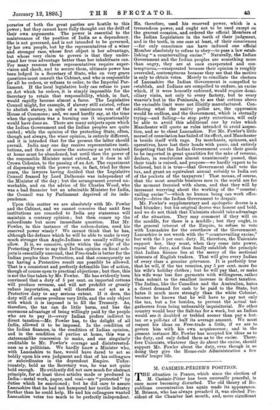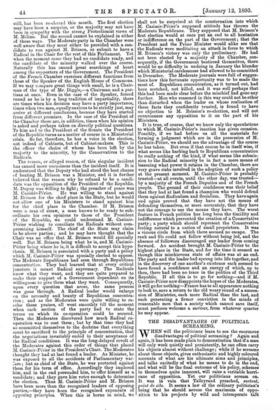M. CASIMIR-PPRIER'S POSITION. T HE situation in France, which since the
election of M. Casimir-Perier has been unusually peaceful, is once more becoming disturbed. The old theory of Re- publican concentration has again made its appearance. M. Brisson, who has always preached it, was elected Pre- sident of the Chamber last month, and, more significant still, has been re-elected this month. The first election may have been a surprise, or the majority may not have been in sympathy with the strong Protectionist views of M. Met line. But the second cannot be explained in either of these ways. The Moderate party in the Chamber were well aware that they must either be provided with a can- didate to run against M. Brisson, or submit to have a Radical in the Chair for the rest of this Parliament. Yet when the moment came they had no candidate ready, and the candidate of the minority walked over the course. Naturally this has caused great searchings of heart among the supporters of the Government. The President of the French Chamber exercises different functions from those of the Speaker of the English House of Commons. If we may campare great things with small, he is a Chair- man of the type of Mr. Diggle,—a Chairman and a par- tisan at once. Even in the case of the Speaker, fenced round as he is by a long tradition of impartiality, there are times when his decision may have a party importance, times when two men, equally anxious to be strictly just, may arrive at different conclusions, because they have started from different premises. In the case of the President of the Chamber there are, in addition, times when his opinion is asked and perhaps taken on directly political questions. To him and to the President of the Senate the President of the Republic turns as a matter of course in a Ministerial crisis. So far, therefore, he has a voice in the election, not indeed of Cabinets, but of Cabinet-makers. This is the officer the choice of whom has been left by the majority to the minority, by the Conservatives to the Radicals.
The reason, or alleged reason, of this singular incident has caused more uneasiness than the incident itself. It is understood that the Deputy who had stood the best chance of beating M. Brisson was a Minister, and it is further believed that the reason why he refused to be a candi- date was the opposition of the President of the Republic. M. Dupuy was willing to fight; the preacher of peace was M. Casimir-Perier. He was willing to stand against 31. Brisson for the chief place in the State, but he would not allow one of his Ministers to stand against him for the chief place in the Chamber. If M. Brisson were a man of straw, a man known to be ready to sub- ordinate his own opinions to those of the President of the Republic, we could understand M. Casimir- Prier wishing to conciliate the Radicals without com- promising himself. The chief of the State may claim to be above parties ; and he may have thought that the Chair was an office that M. Brisson would fill specially well. But M. Brisson being what he is, and M. Casimir- Perier being where he is, it is difficult to accept this hypo- thesis. M. Brisson is associated with a party and a policy which M. Casimir-Prier was specially elected to oppose. The Moderate Republicans had seen through Republican concentration. They had learned that at every critical juncture it meant Radical supremacy. The Radicals know what they want, and they are quite prepared to make their support of a Government dependent on its willingness to give them what they want. Consequently, upon every question that arose, the same process was gone through. A Radical leader would enlarge en the necessity and beauty of Republican concentra- tion; and as the Moderates were quite willing to re- echo these praises, all went smoothly till the moment when each section of the party had to state the terms on which its co-operation could be secured. Then the Moderates discovered how much Radical co- operation was to cost them ; but by that time they had so committed themselves to the doctrine that everything must be sacrificed to the principle of concentration, that the negotiations invariably ended in their acceptance of the Radical conditions. It was the long-delayed revolt of the Moderates against this order of things that placed M. Casimir-Prier in the President's Chair. The Moderates thought they had at last found a leader. As Minister, he was exposed to all the accidents of Parliamentary war- :are ; but as chief of the State, he was protected against them for his term of office. Accordingly they implored him, and in the end persuaded him, to offer himself as a candidate; and they gave him votes enough to determine the election. Thus M. Casimir-Prier and M. Brisson have been more than the recognised leaders of opposing parties,—they have been the recognised exponents of opposing principles. When this is borne in mind, we shall not be surprised at the consternation into which M. Casimir-Perier's supposed attitude has thrown the Moderate Republicans. They supposed that M. Brisson's first election would at once put an end to all hesitation or indifference on the part of the Government ; that the President and the Prime Minister would alike see that the Radicals were meditating an attack in force to which M. Brisson's victory was only the preliminary. He had not been elected by a majority of the Chamber, con- sequently, if the Government bestirred themselves, there would be no difficulty in undoing in January the blunder which Ministerial carelessness had allowed to be committed in December. The Moderate journals were full of sugges- tions how this fortunate opportunity was to be made the most of. Republican concentration, as it turned out, had been scotched, not killed, and it was well perhaps that this had been made clear before the mischief had gone any further. Men who reasoned in this way could not be other than disturbed when the leader on whose realisation of these facts they confidently trusted, is found to have no objection to M. Brisson's re-election, and will not countenance any opposition to it on the part of his Ministers.
It is true, of course, that we know only the speculations to which M. Casimir-Perier's inaction has given occasion. Possibly, if we had before us all the materials for forming a judgment which are in the possession of M. Casimir-Prier, we should see the advantage of the course he has taken. But even if that course be in itself wise, if what seems like harking back to Republican concentration be really nothing of the kind, if what seems like submis- sion to the Radical minority be in fact a mere means of lessening what power it retains in the Chamber, there are very pave risks involved in the adoption of such a policy at the present moment. M. Casimir-Prier is probably trusted—at all events, until the other day, was trusted— by a majority of the French Deputies and of the French people. The ground of their confidence was their belief that they had at last found a champion who would defend them against Radicalism and Socialism. They have again and again proved that they have not the means of defending themselves, or more accurately, that they have not the courage to use the means they have. The worst feature in French politics has long been the timidity and indifference which prevented the creation of a Conservative party ; a party which should represent the Conservative feeling natural to a nation of small proprietor& It was a vicious circle from which there seemed no escape. The rank and file could not follow without being led, and the absence of followers discouraged any leader from coming forward. An accident brought M. Casimir-Perier to the highest place in the State, and for the time it seemed as though this mischievous state of affairs was at an end. The party and the leader had sprung into life together, and in the discovery of one another's existence each seemed to have found a confidence and an energy of which, up to then, there had been no trace in the politics of the Third Republic. If all this is to go for nothing—and if M. Casimir-Perier now disappoints the hopes of the Moderates, it will go for nothing—France has to all appearance nothing to look to, save a return to the old weary round of a succes- sion of Ministries, each more Radical than the last, and each generating a firmer conviction in the minds of reasonable men that a society which cannot save itself, must perforce welcome a saviour, from whatever quarter he may appear.



































 Previous page
Previous page